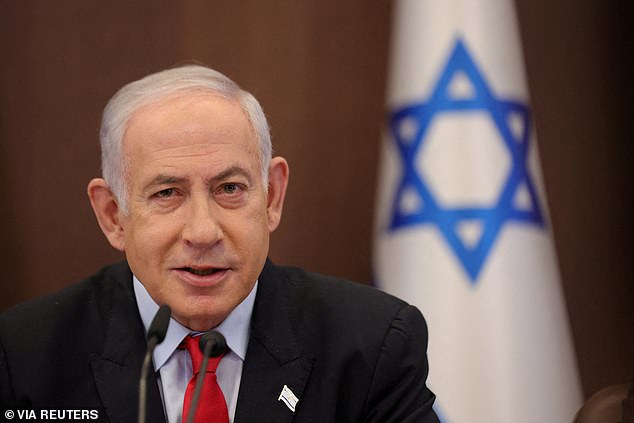MARK ALMOND: Will Benjamin Netanyahu do the right thing – for Israel AND Palestinians?
The murderous invasion by Hamas last week plunged Israel into a political as well as a military crisis.
Benjamin Netanyahu, once widely regarded as ‘Mr. Security’, the man who could be relied upon to keep Israel’s borders secure against all comers, is now widely reviled.
Two opinion polls published on Friday showed that support for the prime minister is tumbling. Asked how they would vote if elections were held this week, respondents to one poll gave Likud, Netanyahu’s ruling party, just 19 seats in the Knesset, out of the 32 it won in last year’s election. Just 29 percent consider Netanyahu the best candidate to become prime minister.
Aside from the intelligence lapses that allowed Hamas fighters to break out of Gaza and the inexcusable delays in sending troops to relieve the siege of kibbutzim, Netanyahu’s failure to address the nation until three days after the attacks began for many that he has lost the certainty. of touch that had been his hallmark for so long.
Nor has he so far dared to meet the families of the 150 people taken hostage by Hamas and herded into Gaza, who will no doubt ask uncomfortable questions about why it took the army so long to help their relatives.

Israeli Prime Minister Benjamin Netanyahu (right) shakes hands with US Secretary of State Antony Blinken (left) during statements to the media inside The Kirya, which houses the Israeli Ministry of Defense, after their meeting in Tel Aviv on October 12
And when he made his first visit to the scene of the massacre on Saturday, he received a distinctly lukewarm reception from troops on the ground, with some soldiers shouting at him to leave.
His stock is just as low in the Israeli parliament, the Knesset. Politicians of all stripes, from left, right and center, are trashing Netanyahu behind the scenes. While he managed to create an emergency coalition with Benny Gantz, a former IDF chief of staff who leads a center-right party, others refused to sign up.
Yair Lapid of the centrist opposition is boycotting the body because, he says, he will not sit next to ‘extremists’ whom he accuses of ‘unforgivable failures’.
Part of Netanyahu’s problem lies in the fact that even before the events of last week, his authority was already seriously undermined.
In July, hundreds of Israeli reservists marched in Tel Aviv, threatening to refuse their voluntary service if the government went ahead with a controversial plan to limit the Supreme Court’s power to review legislation.
“Every soldier who risks his life and goes on a mission is doing so for a state that is defined as Jewish and democratic,” one told Reuters. “But if you take one of them out, if the country ceases to be Jewish or democratic, it is no longer a country that can be protected.”
Critics say Netanyahu is motivated to weaken the courts and change the justice system as a way to open an escape route from the corruption charges he faces.
He has been charged with fraud, breach of trust and accepting bribes in three separate scandals involving powerful media moguls and wealthy associates. He denies any wrongdoing.

Israeli Prime Minister Benjamin Netanyahu attends the weekly cabinet meeting at the Prime Minister’s Office in Jerusalem, September 27
The extent of the disillusionment is bad news for the man the electorate used to know affectionately as ‘Bibi’. Ten days ago, many Israelis said: ‘Whatever is wrong with Bibi as a politician, he has the country covered.’ Not anymore.
Netanyahu used Neville Chamberlain as the embodiment of the kind of conciliatory politician he despised. But it was Chamberlain’s incompetence as a war leader that cost him his premiership in 1940, making way for Churchill.
Netanyahu would have once been posted as Israel’s Winston, but now his grip on power is loosening just at the time he needs the authority most to find a way out of this terrible crisis by releasing the hostages and getting Hamas out of Gaza to expel.
There is a precedent for a solution set back in 1982. After a brutal war in Lebanon, Israel agreed to let Palestinian fighters leave Beirut and go into exile far across the Mediterranean in Tunisia. Palestinian civilians were left behind.
The Israeli prime minister at the time, Menachem Begin, had a strong reputation for making peace with Egypt and could settle for less than total victory. Today, Netanyahu and his political allies are on much shakier ground.
Netanyahu is caught on the horns of a dilemma. Will he do what is right for Israel and ordinary Palestinians, or try to save his premiership regardless of the cost to his own people and the innocents trapped as human shields for Hamas in Gaza?
A brave soldier and statesman should know what choice to make.
Mark Almond is director of the Crisis Research Institute, Oxford
